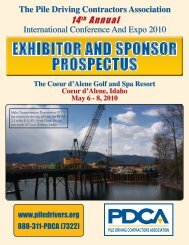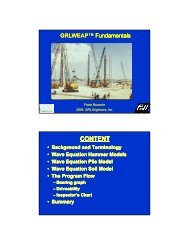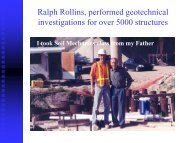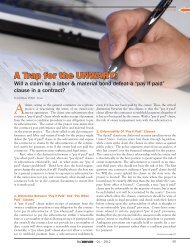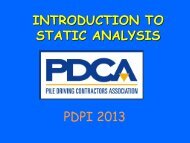Full Issue (17 MB) - Pile Driving Contractors Association
Full Issue (17 MB) - Pile Driving Contractors Association
Full Issue (17 MB) - Pile Driving Contractors Association
Create successful ePaper yourself
Turn your PDF publications into a flip-book with our unique Google optimized e-Paper software.
in English while performing specific job functions, during emergency<br />
situations, or while working in particular areas of a facility that implicate<br />
workplace safety issues.<br />
Employers must also take care in making hiring decisions based<br />
on a candidate’s ability to speak English. A narrowly-tailored and<br />
appropriately used English-only policy is relevant to hiring decisions.<br />
If, for example, an employer has an English-only policy like the one used<br />
in the above example, it would need to consider that policy in hiring<br />
employees to work in the laboratories and processing areas. Candidates<br />
who do not speak English would not be able to adhere to the policy and<br />
would therefore not be qualified for hire into a position that includes<br />
work in those areas. Similarly, even in the absence of an English-only<br />
policy, an employer does not violate federal anti-discrimination laws by<br />
rejecting a non-English-speaking candidate whose inability to speak or<br />
understand English would materially affect his or her ability to perform<br />
job duties. If, for example, a candidate’s job duties would require forklift<br />
operation, and the candidate could not read or understand warning<br />
signs, operating manuals, or safety placards required for the safe<br />
operation of a forklift, then the employer would have a good faith,<br />
non-discriminatory reason for rejecting that candidate.<br />
CONCLUSION AND RECOMMENDATIONS<br />
It is recommended that all employers who employ workers with<br />
limited or no ability to speak or understand English, carefully evaluate<br />
their safety training programs to ensure those employees have received<br />
and understood required safety training, including the following:<br />
• Review the means by which work instructions are communicated<br />
to employees. If work instructions are communicated in languages<br />
other than English, consider providing safety training in those<br />
languages as well.<br />
• Incorporate practical tests into required safety training, allowing<br />
employees to demonstrate their understanding (or lack thereof)<br />
of core concepts.<br />
• Maintain meticulous documentation of employee training,<br />
including any practical tests included in training. Include a signed<br />
statement from each employee that he/she has received and<br />
understood specific safety training provided.<br />
• In the event of an OSHA inspection, advise all employees of their<br />
right to have a management representative present during any<br />
interviews. Designate a qualified and reliable person (whether<br />
management or non-management) to act as the “go to”<br />
interpreter to facilitate interviews with non-English-speaking<br />
employees.<br />
• Evaluate employee duties on a job-by-job basis to determine<br />
whether critical job- or safety-related functions require fluency<br />
in English.<br />
Mark A. Lies, II is a labor and employment law attorney and partner with<br />
Seyfarth Shaw LLP in Chicago, Illinois. He specializes in occupational safety<br />
and health law and related employment law and personal injury litigation.<br />
Lies has worked with CSDA members in their businesses. He can be reached<br />
at 312-460-5877 or at mlies@seyfarth.com.<br />
Elizabeth Leifel Ash is an associate with Seyfarth Shaw, whose practice<br />
focuses on regulatory compliance and litigation, including occupational<br />
safety and health and environmental matters.<br />
REPRINTED FROM CONCRETE OPENINGS | VOL.18 | NUM.3 | SEPTE<strong>MB</strong>ER 2009





